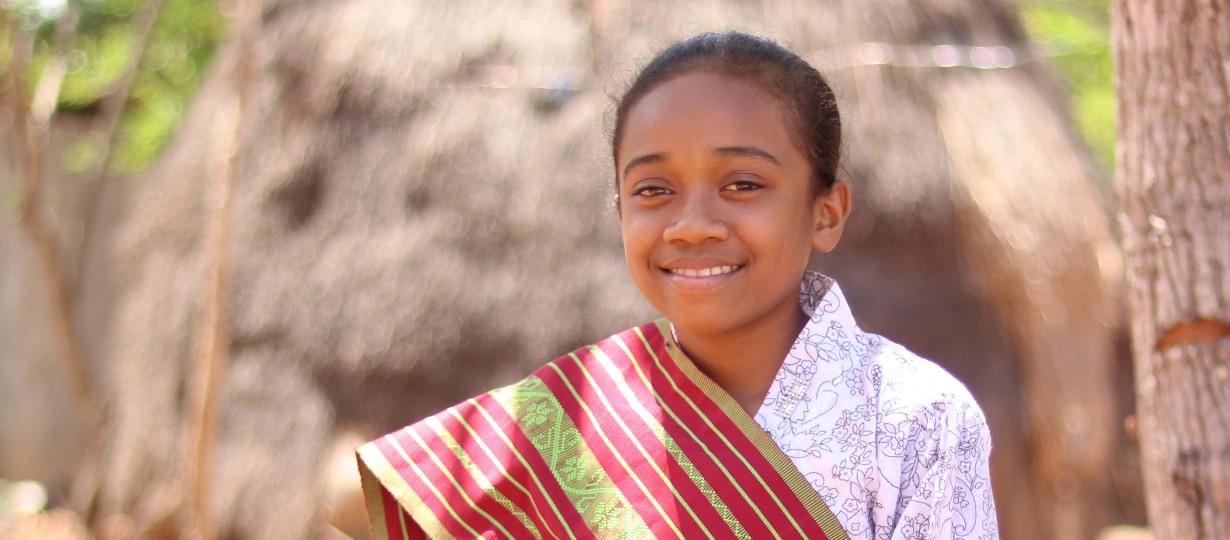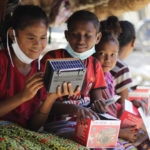Media Centre - Media release - 17 March 2021
New report reveals COVID-19 caused historic disruptions to girls’ high school education across Southeast Asia and the Pacific

One year on since COVID-19 lockdowns, Plan International Australia has raised serious concern for the education outcomes of adolescent girls across South East Asia and the Pacific.
New research by the organisation revealed many girls have been forced to drop out of school, been diverted into household duties, or forced into early marriages and subjected to increased rates of domestic violence.
The findings are detailed in a new report Smart, Successful, Strong: the case for investing in adolescent girls’ education in aid and COVID-19 response and recovery and an online survey by Plan International Australia, the charity for girls equality, who are calling for the Australian government to increase its commitment to the Global Partnership for Education (GPE) to help get girls back to school.
Australia has fallen far behind comparative donor countries in committing to the GPE: on average, leading donor countries committed $98m per year from 2018 to 2020, however Australia’s commitment was only $30m a year, falling far short of other donors such as the UK, US, France and Germany.
The survey, along with a series of workshops revealed that online study was near impossible for the 59% of girls who shifted to learning from home: of these girls, 60% had unreliable internet, 29% felt unsafe online and close to 20% of girls said they couldn’t access devices such as tablets or computers to learn.
Sadly, these disruptions to education have had a profound impact on girls’ mental and emotional well-being. Girls in our workshops spoke of stressful home environments where parents were unable to support their learning, the struggle to prepare for exams and heightened concern about their futures.
Further evidence cited in the report has revealed that the pandemic has led to a dramatic spike in child, early and forced marriages in Indonesia.
From January to June 2020, 24,000 applications for permission to marry underage had been lodged with Indonesia’s district and religious courts – more than two and a half times the total number for the whole of 2012. There were an estimated 33,000 child marriages in 2020, which runs against the overall downward trend seen over the past years in Indonesia.
These results correspond with an increase in calls recorded to domestic violence helplines in South East Asia and the Pacific due to COVID-19. In Bangladesh, a study revealed that beatings by parents or guardians had increased by 42%, calls to the child helpline rose by 40%, and 50% of those interviewed said the safety and security of girls was an issue in lockdown.
Similar emerging data from the Pacific shows that since the outbreak of COVID-19, violence against women and girls, and particularly domestic violence, has intensified. Two in five adolescent girls said they feel unsafe at home and/or unsafe with their intimate partner at times with stress associated with school performance, family members losing income and excessive drinking of family and community members identified as contributing factors.
“Adolescent girls in the region face extraordinary challenges to accessing education. These challenges are unique to their young age and gender,” said Plan International Australia, CEO, Susanne Legena. “The age bracket between 10 and 18 years is pivotal to determining the trajectory of a girls’ life – it’s a time when families make decisions as to whether girls marry, take on low paid work or continue their education.”
With the economic shock of COVID-19 in the South East Asia and Pacific regions predicted to plunge 38 million people below the poverty line (that’s 33 million more than was predicted before the pandemic) girls’ education is one of the first and most crucial aspects to be lost.
“Ensuring girls can complete 12 years of education is one of the best investments that Australia’s aid and development program and governments in the region can make” Ms Legena said. “We know that 12 years of girls’ education could provide the economic benefits that will help power the much-needed economic recovery in the region.”
The World Bank estimates that if girls were able to complete 12 years of high-quality education their earnings could contribute 15 to 30 trillion dollars in lifetime productivity and earnings.
“Australia has a leading role to play as an advocate for gender equality and secondary education in the region” Ms Legena said. “Now is the time for Australia to redouble its efforts as champion of girls’ education by increasing its commitment to the Global Partnership for Education as well as prioritising girls’ access to secondary education as part of its COVID-19 response and recovery plan in the region.
About this report
This report shines a light on the impact of COVID-19 on adolescent girls’ in South East Asia and the Pacific and their experiences of accessing secondary education over the last twelve months. The report is a collaboration between Plan International’s offices in Australia, Indonesia and Vietnam with support from colleagues and partners across the Asia Pacific region.
The report is not an exhaustive list of the barriers to girls’ education but reflects the voices of girls through workshops we conducted in Vietnam, Indonesia and Kiribati together with an online survey of 445 girls aged 15 to 19. It also synthesises previous surveys of adolescent girls in the region to strengthen girls’ voices in this report. The most up to date data and girls’ views paint a picture of some of the key factors that have stopped adolescent girls from fulfilling their right to education over the last twelve months.
The report also set out girls’ views on how to rebuild after COVID-19. Adolescent girls in the report call on donors and governments to create strategies and invest in pathways that will support girls to rebuild their lives and to transform education systems.
This report is intended to be a rallying cry to all donors and governments to act now, not only to stop the unravelling of decades of progress in education but to create a world where girls are supported by their families, their communities and their governments to fulfil their right to 12 years of education,
About the Survey data
The survey data was based on interviews and online surveys conducted by 450 adolescent girls aged 15 to 19 across 10 countries in South-East Asia and the Pacific including Indonesia, Vietnam, Philippines, Thailand and Fiji, as well as from workshops held with girls in Indonesia, Vietnam and Kiribati.
Media contacts


